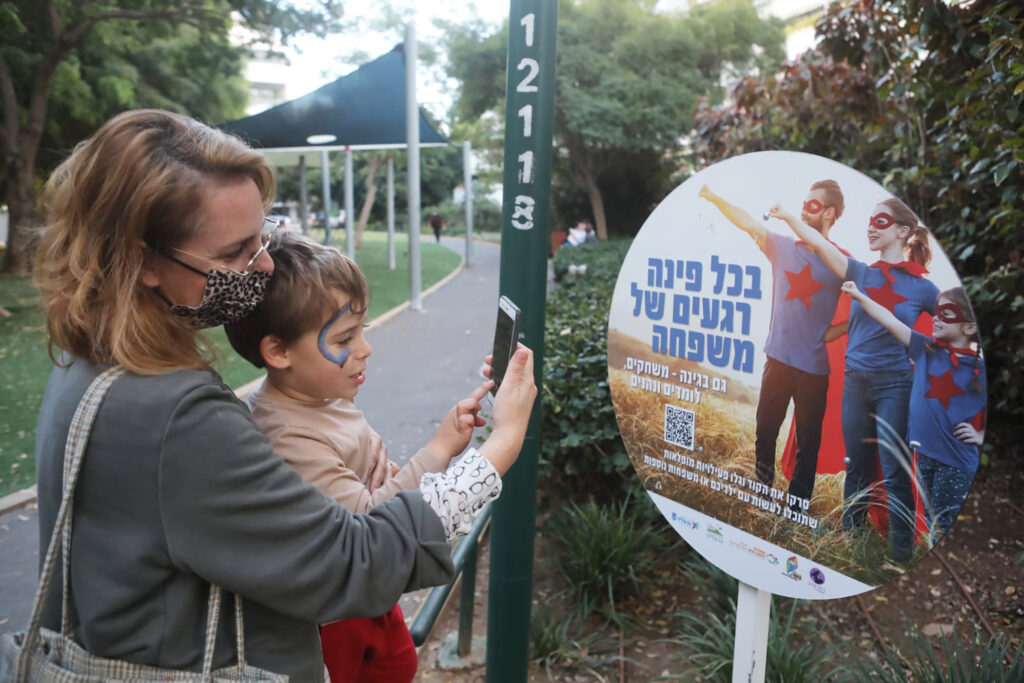“We know what it means to be parents today, it is not easy”
Hop! Media helps caregivers fill daily routines with pleasure not pressure: An interview with Alona Abt
Hop! Media helps caregivers fill daily routines with pleasure not pressure: An interview with Alona Abt
 Photo: Courtesy of Bernard van Leer Foundation.
Photo: Courtesy of Bernard van Leer Foundation.
Doing groceries, going home after a doctor’s visit,
preparing dinner: there are so many times during
the day in which parents have to do dreary chores,
and having their children with them can feel like
more of a burden than a joy. It doesn’t need to be
that way: parents can take advantage of everyday
routines to create memorable moments of bonding
with their child while boosting the child’s brain
development.

Alona Abt
This is the message of the Magic Moments and Beautiful Moments campaigns, respectively in Hebrew and Arabic, developed by Hop! Media Group, who own Israel’s leading television channels for preschoolers. Hop! designed the behaviour change campaigns with a team of child psychologists, behavioural scientists and digital marketing experts, with input from a national survey of parents and focus groups of parents and children.
The campaigns share practical suggestions for simple activities that parents can do with their children. They started with television programmes and social media content, and expanded through a range of partners. They are now seen everywhere, from QR codes in playgrounds to posters at train stations, signs in supermarkets and messages on milk cartons. An evaluation found that 58% of parents reached by the campaign said they better appreciated everyday moments with their children,while 44% had put some of the ideas into practice (Baruch et al., 2021).
In conversation with Irene Caselli, Alona Abt – founder, co-owner and CEO of Hop! Media Group – talks about the experience of incorporating a behavioural lens in a multi-channel campaign.
As a child, I was very fortunate. I grew up with a very smart and creative mum who knew how to turn everyday things into something special. After 20 years as Israel’s leading preschool television channel, Hop! knew how to captivate preschoolers. I felt that we could take our work to the next level by talking more directly to the parents to create an impact on family life.
We had three main aims. First, to raise parents’ awareness of ways they can impact their children’s development in the shared time they have. Second, to give parents practical, evidence-based ideas for simple daily activities. And third, to encourage parents to adopt new behaviours that can benefit their children’s development.
We started by looking at the practical side. When do parents have most time with their children: in the morning, on the way to school, at bedtime? What are the pain points of each of these times? What do parents find stressful rather than pleasurable? These are potentially the times when parents could be contributing more to their child’s development. Then we wanted to understand what are the differences between mums and dads and different income groups.
Finally we started to think creatively about what suggestions we could make to parents. We realised that we could not deal with all the pain points. For example, many parents told us that they find the morning time to be especially stressful – and realistically we felt it is too stressful a time for us to suggest games they could play.
We just wanted to reach parents. One of our first collaborations was with a leading newspaper, to get the phrase “Magic Moments” out there and make parents curious. Then we started looking for places where the average parent spends time – such as supermarkets and doctors’ waiting rooms – and created partnerships based on that.

Photo: Courtesy of Nimrod Glickman
We got government ministries on board, national community centres, daycares, health clinics, and the private sector. Some experiments worked and some didn’t. Most initiatives with the private sector were very successful because the private sector is quick to make decisions and execute them.
“Only one kind of stimulus, one kind of messaging, or one kind of exposure is not enough to create an impact on behaviour”
Creating a network of different partners is key. Only one kind of stimulus, one kind of messaging, or one kind of exposure is not enough to create an impact on behaviour. People need to find the same messages from different places over a sufficient length of time.
The goals were the same, but we had to design Beautiful Moments specifically for the routines and cultural concepts of Arabic-speaking parents. We researched the differences within the Arab community to understand what kinds of family we needed to portray – for example, a very religious family, a family that lives in a village, a family that lives in the city. There was a special challenge in reaching fathers, who are traditionally less involved.
It made us think about how we might approach expanding beyond Israel. One possibility is an animated version showing everyday moments with short suggestions, which could be a basis for adding local expertise – it’s important that people don’t feel as if some expert is coming from a different country telling them what to do.
Television is a one-direction medium of communication – you just broadcast, you don’t know
how children understand what they are seeing. With digital media you can collect a lot of data, but you still don’t know whether it really affects people’s lives. With this campaign we knew we would be working with a research team that would evaluate whether we’re actually making a difference in real life.
“It’s brave to say “I want to change how people behave” – you’re putting your neck out and taking a risk.”
And that’s frightening. It’s brave to say “I want to change how people behave” – you’re putting your neck out and taking a risk. You know you’ll bejudged on how well you succeed, and you have to be mentally prepared for the possibility that you may not.
Parents are overloaded with stress, with guilt, with the feeling that they are not adequate, that they’re not doing enough. It is very important that we don’t use a preaching tone, but instead have an attitude of “Hey, we know what it means to be parents today, it is not easy. We have a good idea for you.”
The campaigns prove that, with the right approach, we really can make a difference.
All references can be found in the PDF version of this article.
See how we use your personal data by reading our privacy statement.
This information is for research purposes and will not be added to our mailing list or used to send you unsolicited mail unless you opt-in.
See how we use your personal data by reading our privacy statement.